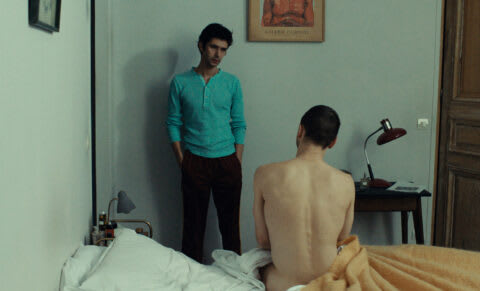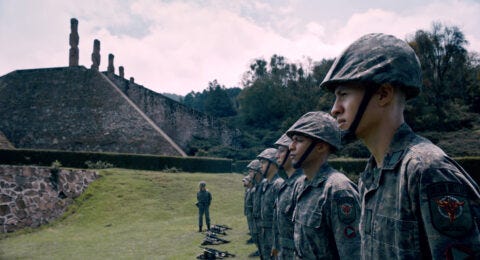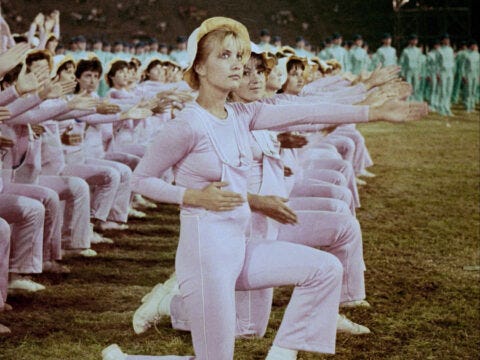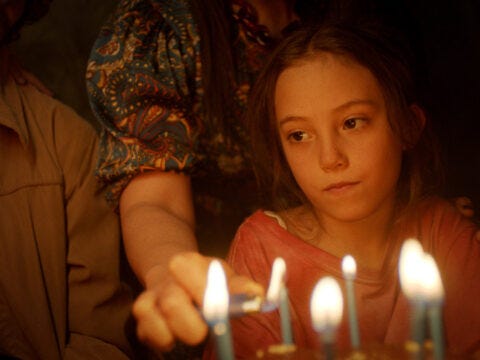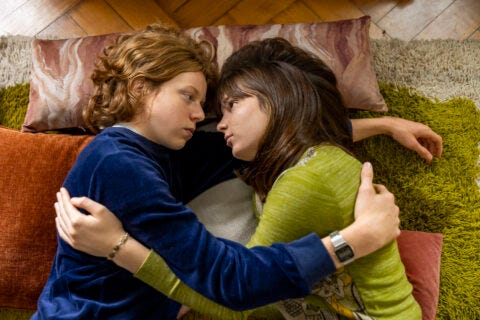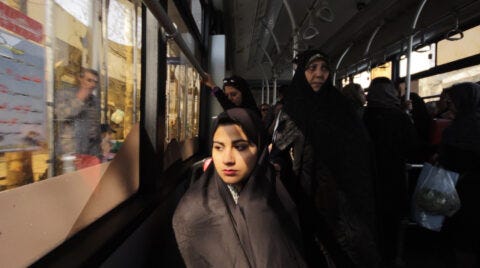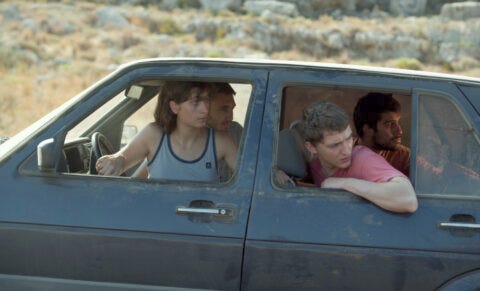This year’s Berlinale is starting to feel like a great one.
There’s all different types of genres. Different modes of expressions. Exciting debut or second time feature directors. And films that make you look at yourself or the world around you in a slightly different way.
Then there’s all the tired tropes. Or the obtuse visions. Or the nonsensical and boring. A heady mixture of trips to the kino that is at once invigorating and exasparating.
Here’s what we’ve been covering:
Passages: A Perfect Parody of French Cinema
If an American were to write a plain, non-comic version of a French relationship drama — with the spontaneous sex, the jealous lovers, conversations over wine in trendy bars, people riding their little bikes through the streets of Paris and characters that put their ego above all else — then you’d have a film like Passages (Ira Sachs, 2023). It certainly looks like the real thing. But it feels nothing like it. It feels like the perfect parody.
The parody is so perfect, in fact, it’s airless. There’s simply not much there at all.
In Heroic, The Military Is Anything But
The recruits are known as potros. Meaning Colt in English (a baby horse), the term refers to their metaphorical inability to find their feet among the brutal, cultish, Mexican army.
Hazings, beatings, tortures and sadistic games abound; they’re all treated as part of the necessary firmament that makes the military great.
Berlinale Forum 2023: An Incomplete Past Treating an Unclear Future
From Nick Kouhi:
History is of no small consequence, least of all to longstanding institutions.
The Berlinale’s Forum programme, independently curated by the Arsenal Institute for Film and Video Art, is already over half a century old, and encompasses a sizable portion of the festival’s history. It’s fitting, then, that the handful of films I saw from this year’s selection probe the ways history, ever contested, is inscribed onto the future. From traditional documentaries to more unorthodox modes of reflection, the highlighted filmmakers often interpolate their personal stakes upon the subjects they depict — in ways both oblique and direct.
Tótem Piercingly Asks If Love is Enough
I counted various living entities throughout Mexican Competition entry Tótem (Lila Avilés, 2023):
Three dogs
A parrot
A pigeon
A slug
A kitten
A goldfish
A scorpion
And a bonsai tree
The living world is all around us. All these things are constant reminders of mortality.
A Brief Foray into The Generation Section
At first glance, Generation appears to be a film programme aimed at kids. Submissions must be about children, teenagers or young adults. But on second glance, it’s a far more interesting and robust programme, using its look at non-grown up lives as a means to reflect on the world at large. There might be less experimentation than Forum, or fewer big swings than Encounters, or fewer big faces than the Competition, but Generation is certainly a great place to look for filmmakers expressing a unique point-of-view through either a childlike perspective, or through the eyes of a child.
It can score some big hits too. After all, The Quiet Girl (Colm Bairéad, 2022), honoured in the Foreign Language Film section, is the only feature film at last year’s Berlinale to be nominated for an Oscar (Haulout, (Maxim Arbugaev, Evgenia Arbugaeva, 2022), is nominated for Best Documentary Short). To see if I can potentially spot the next big thing, I’ve wandered over to the Generation section.
Further Adventures in the Panorama Section: Women Strike Back
My previous Panorama post was about women on the brink, pushed by a patriarchal system to the edges of society. The good news is that my further adventures in this wide-ranging section shows women striking back: symbolically, violently, confusedly. Spanning Iran, South Korean and Burkino Faso, we have a lyrical documentary, a revenge thriller and a descent into an urban underworld to dive into. Shall we?
You Have to Try Very Hard to Appreciate Angela Schanelec’s Music
From Audrey Fox:
An Oedipal tale for the modern age, director Angela Schanalec blends formalism and abstract formlessness in Music (2023).
Jon (Aliocha Schneider) grows up in the Greek mountains, raised by the paramedic who rescued him as an infant. When he’s 20 years old at the beach with his friends, he inadvertently kills a man. For this, he is sent to prison, where he falls in love with one of the female wardens, Iro (Agathe Bonitzer), who seems to have an instinctual desire to take care of him. The two have a daughter together, Phoebe (Frida Tarana and Ninel Skrzypczyk), and live in happiness together – until she discovers his parentage, with tragic consequences.



